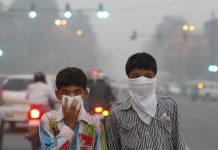New Delhi: COVID-19 inoculation guidelines issued by the Union Health Ministry do not envisage forcible vaccination without obtaining the consent of an individual, the Centre has told the Supreme Court.
Union Health Ministry in an affidavit filed before the top court submitted that India’s vaccination programme is the largest in the world and as on January 11, 2022, a total of 1,52,95,43,602 doses have been administered.
It said that 90.84 per cent of the eligible adult population has received their first dose of the vaccine and 61 per cent has received their second dose as well.
“Furthermore, a total of 23,768 doses have been administered to disabled persons who have voluntarily chosen to be identified as such by using their Unique Disability ID Card/Disability Certificate for registration at the time of their vaccination,” it said.
On the issue of exempting persons with disabilities from producing vaccination certificates, the Centre told the apex court that it has not issued any SOP that makes it mandatory to carry the vaccination certificate for any purpose.
The Centre said this in its affidavit filed in response to a plea by NGO Evara Foundation seeking door-to-door, priority COVID-19 vaccination for persons with disabilities.
“It is submitted that the direction and guidelines released by the Government of India and the Ministry of Health and Family Welfare do not envisage any forcible vaccination without obtaining consent of the concerned individual.
“It is submitted that vaccination for COVID-19 is of larger public interest in view of the ongoing pandemic situation,” the affidavit filed by the Health Ministry said.
The ministry said that “it is duly advised, advertised and communicated through various print and social media platforms that all citizens should get vaccinated and systems and processes have been designed to facilitate the same.”
“However, no person can be forced to be vaccinated against their wishes,” it said.
On the issue of door-to-door vaccination, the affidavit submitted that guidance has been provided to states and union territories to undertake meticulous, need-based planning so that Near to Home Vaccine Centres (NHCVCs) strategy is undertaken at block or urban area level and identification of NHCVC sites done according to guidelines.
The location of NHCVCs is to be done by district/urban task forces so as to ensure maximum reach of services to the eligible population, it said.
The Health Ministry stressed on the need for continuing the use of face masks or face covers, and said the “Har Ghar Dastak Abhiyan” was being followed for door-to-door vaccination of eligible beneficiaries, including persons with disabilities.
It also apprised the apex court that such persons not having ID cards are also eligible for vaccination since the CoWIN website provides the facility for creation of special vaccination sessions for this purpose.
“It is submitted that the CoWIN public interface is available in 11 regional languages in addition to English. It is also submitted that open files of awareness materials have been shared with the states for translation, publication and dissemination in any language/accessible format,” the affidavit said.













